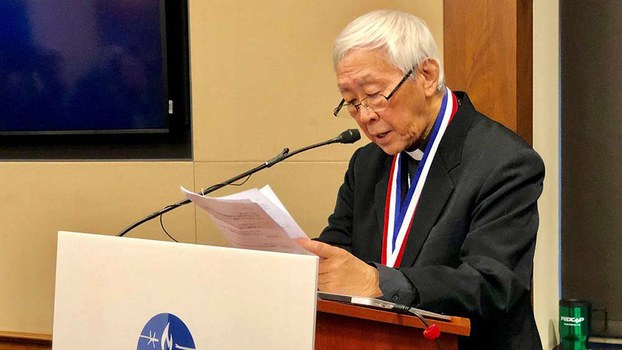




Outspoken Hong Kong Cardinal Joseph Zen has hit out at Germany's international broadcaster, Deutsche Welle, after it packaged with his interview an account by DW's religious correspondent of the Vatican's conflicting view of a controversial deal between Beijing and the Vatican over the running of the Catholic Church in China.
Zen, who has long been an outspoken critic of the Chinese Communist Party (CCP), took issue with the framing of an interview that was aired on the Deutsche Welle website on Oct. 28.
He said the organization had invited its religious affairs correspondent to counter his criticism of the deal without informing him that this would happen.
"After watching it, I was disappointed and angry - the interview turned out to be the first half of the item, and the second half was an interview with 'our religious affairs correspondent'," Zen wrote on his blog on Monday.
"You ask to interview me ... then you arrange for someone else (who merely parrots the Vatican's words) to counter what I said ... and then you end the item with this, without allowing me to defend myself or explain my views again," Zen wrote.
"Curious: Is your organization actually funded by the German or Chinese government?" he wrote.
Deustsche Welle responded by saying its religious affairs correspondent Martin Gak had been brought in to give "background and context."
"His allegations are baseless," Deutsche Welle spokesman Christoph Jumpelt said in comments emailed to RFA. "He was given the opportunity to voice his unedited opinion in the interview."
"The fact that we had a journalist give background and context for the benefit of our viewers was absolutely called for in regard of the complexity of the story," the spokesman said.
Zen has repeatedly lambasted the Vatican's controversial deal with Beijing on the appointment of bishops, which was struck in 2018 and extended last month.
He told Deutsche Welle in the Oct. 28 interview that doing deals with Beijing is "immoral," and that the 2018 deal had left millions of underground Chinese Catholics with no support from Rome, and at the mercy of persecution at the hands of the CCP.
"[In] the two years since the agreement, things went very wrong, because the underground [church in China] received no support from the Vatican," Zen said.
"The Holy See doesn't give new bishops to the underground [church]. They give many bishops to the official church ... [they] made them legitimate," he said.
"And so the underground feels abandoned. Betrayed. Because they [were the ones who stayed] faithful to the authority of the Pope."
'Understandable position'
His interview was followed by an interview with religious affairs correspondent Martin Gak, who said that the Vatican's position "is actually ... fairly understandable."
"They concentrate on engagement because they think that [no agreement] ... leaves the Catholic communities in China at a very serious disadvantage," Gak said.
"How is the Vatican to calculate how to protect these communities other than to some degree engaging the Chinese Communist Party?" he said.
"Letting the Chinese government do as they please ... it’s no solution at all," Gak said. "It leaves all of those people ... in a very precarious situation."
Zen addressed that argument -- which has also been made by the Vatican -- in comments made during his interview.
"How can they say that a bad agreement is better than no agreement?" he said.
"A bad agreement is an agreement which is immoral, which is against our faith," Zen told the station.
"I suspect that [the Vatican] wants to have diplomatic relations re-established, but that's very bad because that's a political thing, not religious," he said.
Pope Francis silent on abuses
The controversial deal struck in November 2018 eliminated the division between bishops and churches recognized by the CCP-backed Catholic Patriotic Association and those appointed by Rome.
Under the agreement, Rome recognized seven bishops appointed by the Chinese state, and the agreement also saw the founding of a new Catholic diocese in Chengde, in the northern province of Hebei.
However, Pope Francis has since remained silent on the mass incarceration of Uyghurs and other Muslim minority groups in the northwestern Xinjiang Uyghur Autonomous Region of China and other human rights abuses.
The renewal of the deal comes amid a nationwide crackdown on religious worship under CCP general secretary Xi Jinping, who regards Christianity as a dangerous foreign import, with CCP documents warning against the "infiltration of Western hostile forces" in the form of religion.
China's ruling party embraces atheism, yet exercises tight controls over any form of religious practice among its citizens, frequently raiding churches, seizing or demolishing their property, and detaining their members and leaders, often because they refuse to join state-sponsored bodies, or because they are becoming too large and prominent.
Religious beliefs are increasingly seen by Chinese officials as something that must not be allowed to assume greater importance than CCP rule or Xi's personal brand of political ideology.
China is home to an estimated 68 million Protestants, of whom an estimated 23 million worship in state-affiliated churches, and some nine million Catholics, 5.7 million of whom are in state-sponsored organizations.
Reported by RFA's Cantonese Service. Translated and edited by Luisetta Mudie.